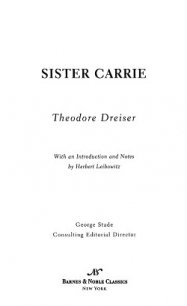Jennie Gerhardt - Драйзер Теодор (книги без регистрации бесплатно полностью сокращений .txt) 📗
nearly eight years, hasn't it?"
"About that," replied Lester. "How are things with you?"
"Oh, about the same. You've been fairly well, I see."
"Never sick," said Lester. "A little cold now and then. I don't often go to bed with anything. How's your wife?"
"Oh, Margaret's fine."
"And the children?"
"We don't see much of Ralph and Berenice since they married, but the others are around more or less. I suppose your wife is all right," he said hesitatingly. It was difficult ground for Robert.
Lester eyed him without a change of expression.
"Yes," he replied. "She enjoys pretty fair health. She's quite well at present."
They drifted mentally for a few moments, while Lester inquired after the
business, and Amy, Louise, and Imogene. He admitted frankly that he
neither saw nor heard from them nowadays. Robert told him what he
could.
"The thing that I was thinking of in connection with you, Lester," said Robert finally, "is this matter of the Western Crucible Steel Company.
You haven't been sitting there as a director in person I notice, but your attorney, Watson, has been acting for you. Clever man, that. The
management isn't right—we all know that. We need a practical steel man
at the head of it, if the thing is ever going to pay properly. I have voted my stock with yours right along because the propositions made by
Watson have been right. He agrees with me that things ought to be
changed. Now I have a chance to buy seventy shares held by Rossiter's
widow. That with yours and mine would give us control of the company. I
would like to have you take them, though it doesn't make a bit of
difference so long as it's in the family. You can put any one you please in for president, and we'll make the thing come out right."
Lester smiled. It was a pleasant proposition. Watson had told him that
Robert's interests were co-operating with him. Lester had long suspected
that Robert would like to make up. This was the olive branch—the
control of a property worth in the neighbourhood of a million and a half.
"That's very nice of you," said Lester solemnly. "It's a rather liberal thing to do. What makes you want to do it now?"
"Well, to tell you the honest truth, Lester," replied Robert, "I never did feel right about that will business. I never did feel right about that
secretary-treasurership and some other things that have happened. I don't want to rake up the past—you smile at that—but I can't help telling you
how I feel. I've been pretty ambitious in the past. I was pretty ambitious just about the time that father died to get this United Carriage scheme
under way, and I was afraid you might not like it. I have thought since
that I ought not to have done it, but I did. I suppose you're not anxious to hear any more about that old affair. This other thing though—"
"Might be handed out as a sort of compensation," put in Lester quietly.
"Not exactly that, Lester—though it may have something of that in it. I know these things don't matter very much to you now. I know that the
time to do things was years ago—not now. Still I thought sincerely that
you might be interested in this proposition. It might lead to other things.
Frankly, I thought it might patch up matters between us. We're brothers
after all."
"Yes," said Lester, "we're brothers."
He was thinking as he said this of the irony of the situation. How much
had this sense of brotherhood been worth in the past? Robert had
practically forced him into his present relationship, and while Jennie had been really the only one to suffer, he could not help feeling angry. It was true that Robert had not cut him out of his one-fourth of his father's
estate, but certainly he had not helped him to get it, and now Robert was thinking that this offer of his might mend things. It hurt him—Lester—a
little. It irritated him. Life was strange.
"I can't see it, Robert," he said finally and determinedly. "I can appreciate the motive that prompts you to make this offer. But I can't see the wisdom of my taking it. Your opportunity is your opportunity. I don't want it. We can make all the changes you suggest if you take the stock. I'm rich
enough anyhow. Bygones are bygones. I'm perfectly willing to talk with
you from time to time. That's all you want. This other thing is simply a
sop, with which to plaster an old wound. You want my friendship and so
far as I'm concerned you have that. I don't hold any grudge against you. I won't."
Robert looked at him fixedly. He half smiled. He admired Lester in spite
of all that he had done to him—in spite of all that Lester was doing to him now.
"I don't know but what you're right, Lester," he admitted finally. "I didn't make this offer in any petty spirit though. I wanted to patch up this matter of feeling between us. I won't say anything more about it. You're not
coming down to Cincinnati soon, are you?"
"I don't expect to," replied Lester.
"If you do I'd like to have you come and stay with us. Bring your wife.
We could talk over old times."
Lester smiled an enigmatic smile.
"I'll be glad to," he said, without emotion. But he remembered that in the days of Jennie it was different. They would never have receded from their position regarding her. "Well," he thought, "perhaps I can't blame them.
Let it go."
They talked on about other things. Finally Lester remembered an
appointment. "I'll have to leave you soon," he said, looking at his watch.
"I ought to go, too," said Robert. They rose. "Well, anyhow," he added, as they walked toward the cloakroom, "we won't be absolute strangers in the future, will we?"
"Certainly not," said Lester. "I'll see you from time to time." They shook hands and separated amicably. There was a sense of unsatisfied obligation and some remorse in Robert's mind as he saw his brother walking briskly
away. Lester was an able man. Why was it that there was so much feeling
between them—had been even before Jennie had appeared? Then he
remembered his old thoughts about "snaky deeds." That was what his brother lacked, and that only. He was not crafty; not darkly cruel, hence.
"What a world!" he thought.
On his part Lester went away feeling a slight sense of opposition to, but also of sympathy for, his brother. He was not so terribly bad—not
different from other men. Why criticise? What would he have done if he
had been in Robert's place? Robert was getting along. So was he. He
could see now how it all came about—why he had been made the victim,
why his brother had been made the keeper of the great fortune. "It's the way the world runs," he thought, "What difference does it make? I have enough to live on. Why not let it go at that?"
CHAPTER LXI
The days of man under the old dispensation, or, rather, according to that supposedly biblical formula, which persists, are threescore years and ten.
It is so ingrained in the race-consciousness by mouth-to-mouth utterance
that it seems the profoundest of truths. As a matter of fact, man, even
under his mortal illusion, is organically built to live five times the period of his maturity, and would do so if he but knew that it is spirit which
endures, that age is an illusion, and that there is no death. Yet the race-thought, gained from what dream of materialism we know not, persists,




